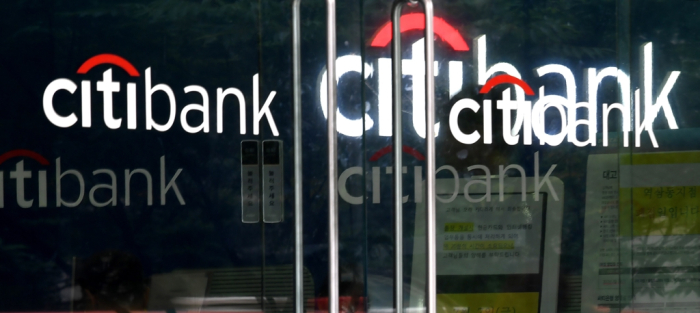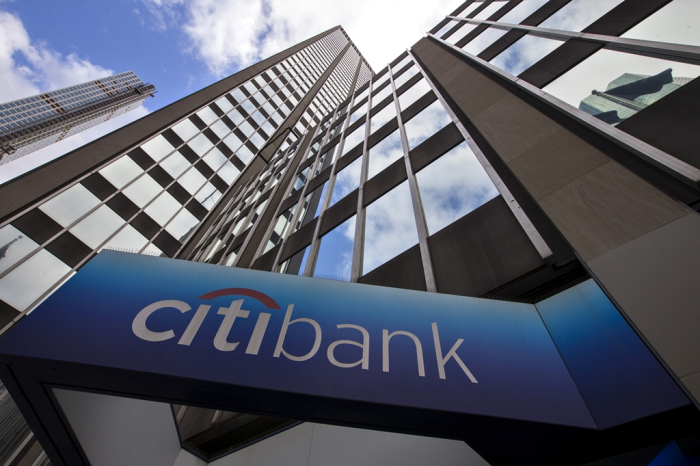M&As
Sale of Citibank Korea gains traction; preferred buyer may emerge in July
The bank wants a swift exit before job security becomes an issue among workers and politicians
By Jun 29, 2021 (Gmt+09:00)
3
Min read
Most Read
Samsung shifts to emergency mode with 6-day work week for executives


CJ CheilJedang to sell feed, livestock unit for $1.4 bn


Samsung Electronics' key M&A man returns; big deals in the offing


Affinity to buy SK Rent-a-Car at $572 mn, more deals expected


Keppel REIT to sell Seoul-based prime office T Tower



The sale of Citibank KoreaŌĆÖs consumer banking business is gaining traction as potential bidders have started due diligence of the bank, with expectations that a preferred buyer could be chosen as early as next month.
According to the banking industry on Tuesday, multiple financial service providers that have already submitted a letter of intent to buy the Citibank business have begun looking into confidential documents through a virtual data room provided by the bank.
Citing a non-disclosure agreement, Citibank declined to identify the bidders, but previously said more than four financial companies showed interest.
Once the online due diligence is completed, Citibank could announce the top potential buyer in July at the earliest, according to industry officials.
Since Citigroup Chief Executive Jane Fraser on Apr. 15 announced the US banking giant intended to pull out of 13 countries, its South Korean operations have been in contact with domestic bidders.
Industry watchers say Citigroup wants to complete the sale as soon as possible -- before the tricky issue of job security at Citibank Korea becomes an issue for politicians ahead of next yearŌĆÖs presidential election in Korea.
Back in 2013, HSBC pulled out of the Korean retail market by closing its local branches after a tussle with workers over job security.
Earlier this month, Citibank Korea said it is also reviewing plans to break up the business for separate sales or phased liquidation if conditions are not met.
KB, SHINHAN, DGB AMONG POTENTIAL BIDDERS
Names of some likely bidders are already floating around in the market.
Industry sources picked KB Financial Group, Shinhan Financial Group and DGB Financial Group as potential candidates to buy Citibank KoreaŌĆÖs retail operations.
They said KB and Shinhan could benefit from acquiring CitibankŌĆÖs strong wealth management skills and overseas fund operation capabilities.
As of the end of May, Citibank Korea consigned 1.41 trillion won ($1.25 billion) to overseas funds, accounting for 86.8% of its total fund products. That compares with KB Kookmin BankŌĆÖs 32.6% and Shinhan BankŌĆÖs 21.8%.
Citibank KoreaŌĆÖs other strength is its credit card business, which counts high net-worth individuals (HNWIs) as its clients.
Since its tie-up with Shinsegae Department Store in 2008, Citibank has unveiled a series of premium credit cards, enjoying popularity among KoreaŌĆÖs high-end users.
Both KB and Shinhan can also leverage CitibankŌĆÖs partnership with Shinsegae to strengthen their card businesses, according to industry officials.
Meanwhile, the purchase of Citibank Korea would give DGB Financial a broader banking network in Seoul and the surrounding metropolitan area, they said. DGB originates from Daegu Bank, based in the city of Daegu, southeast of Seoul.

LABOR COSTS BIGGEST STUMBLING BLOCK
The biggest roadblock to the sale of Citibank Korea is its high-cost structure.
The average salary of Citibank KoreaŌĆÖs employees is estimated at 112 million won, higher than that of most domestic banks, given their long tenure at 18.3 years on average as of the end of last year.
Potential bidders are reportedly hesitant to take on all the staff in the consumer banking segment as a successful buyer may be asked to pay as much as 1 trillion won in labor costs, including the severance pay.
The bankŌĆÖs exit plans have drawn strong opposition from its labor union with some 2,600 members. Earlier this month, the union voted for a strike if the management proceeds with partial sales or liquidation without a full guarantee on job security.
Citigroup entered South Korea's consumer banking market in 2004 by acquiring then KorAm Bank. Then, it sharply reduced the number of retail branches in 2014 and 2017, following HSBC's pullout of the Korean retail market.
Write to Jin-Woo Park and Nan-sae Bin at jwp@hankyung.com
In-Soo Nam edited this article.
More to Read
-
 Business liquidationCitibank alludes to S.Korean retail business closure
Business liquidationCitibank alludes to S.Korean retail business closureJun 04, 2021 (Gmt+09:00)
2 Min read -

Comment 0
LOG IN


